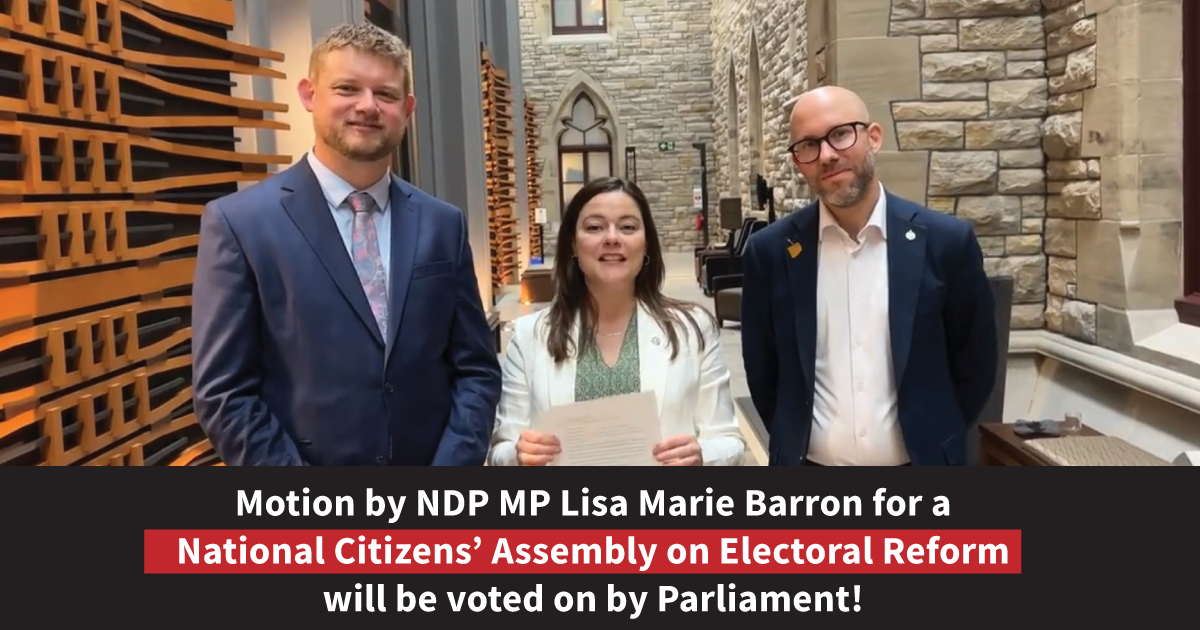There’s a push right now for a National Citizens’ Assembly on Electoral Reform to be created. An NDP MP, in cooperation with a Green MP, is putting forward a motion (M-86) to that effect. Parliament will vote on this either this Fall or early Winter. Here’s a petition on it (sign today): https://www.danielblaikie.ca/a_citizens_assembly
This will need some more reading.
Canada’s best achievements were made under a minority government. The idea that we’ll lose the configuration that requires the most open consensus to move forward, that idea doesn’t sit well.
Proportional representation increases minority government situations. Other systems maybe don’t increase that, but instead decrease the chance of a popular minority getting a solid majority of seats.
Minority governments aren’t possible under a different electoral system? I thought the point was more-proportional representation, essentially guaranteeing that nearly all future governments will be minority governments given the split of political opinions in the various regions in Canada…
The problem with many other systems is that it puts an inordinate amount of power in the hands of the smallest party in government. You need only look at the current agreement between the Liberals and the NDP. The NDP have been able to force the Liberals to implement the very popular with the people national dental care plan.
The danger is that an extremist party with one or two seats could, as the balance of power in the house, force the government to implement an extremist agenda to retain power. We need only look to Israel as a cautionary example of the influence of small, extremist parties.
So, we need a system that represents the will of the majority of people while giving the minority a proportionate say in government.
Hell, just getting a government that represents the will of the majority of Canadians would be fucking awesome.
No one, at least that I’m aware of, has suggested a system like the one Israel has. Generally what’s suggested is a hybrid system between PR and FPTP. Open List Mixed Member Proportional (MMP) or Single Transferable Vote (STV) are the two most common examples. Fascist parties don’t get enough votes to get a seat in such systems.
And anyway, a Citizens’ Assembly, from a non-biased start, would look at and study different issues pertaining to electoral reform. Given the issues with our current system, that can only be a good thing.
The issue that I have with STV is that one of the big parties is always going to win and be in control. We’ve seen that when the big parties are in control they don’t always do things that are popular with the people (national dental care has the support of 72% of Canadians but the Liberals only did it because the NDP forced them to.
If you look back at the last few Canadian elections the leftist vote is always above 50%. The Conservatives have never beaten the Liberals + NDP in an election. Canada’s government should lean left, always, because that is how the majority of Canadians vote and that’s how the surveys consistently show we lean. Conservative FPTP governments in Canada are an aberration.
The issue that I have with STV is that one of the big parties is always going to win and be in control.
What makes you say that? Are you confusing STV with AV? They are two different things.
See image comparing results of an STV election and an AV election: https://www.fairvote.ca/wp-content/uploads/2021/12/Tasmania-and-Western-Australia.png
Huh. That makes sense.
It still skews the popular vote, though. The winning party got a few extra percent while the lowest parties got less.
True, but it comes out pretty close. STV would be a huge improvement over our current system of FPTP. My personal favourite though is open list mixed member proportional. But, regardless, I feel it would be good for there to be an unbiased National Citizens Committee on Electoral Reform, to research and make recommendations to the politicians on improvements to our electoral system.
I agree. I would like to see a system that truly reflects the preference of the people but that eliminates the possibility that a tiny, extremist party could punch above it’s weight.




